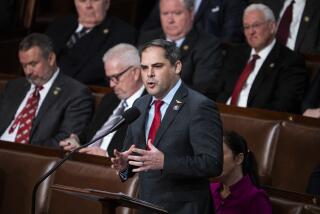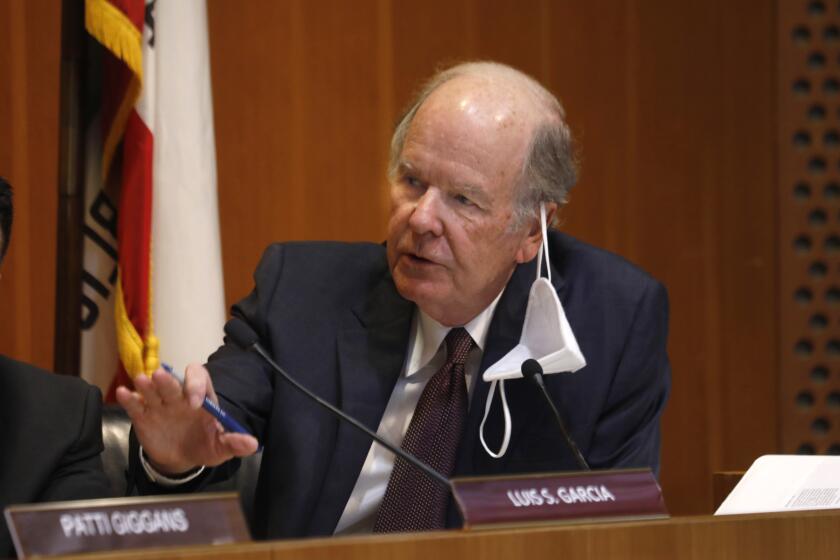Environmentalist to Manage Bradley Drive for Governor
- Share via
Mary Nichols, a well known environmentalist and former head of the state Air Resources Board, has been named manager of Los Angeles Mayor Tom Bradley’s still-unannounced 1986 gubernatorial campaign, which is trying to improve his standing with the environmental movement.
Nichols, an attorney, has stepped down as president of the League of Conservation Voters, an environmentally oriented political action committee, to take over day-to-day management of the Bradley campaign after his expected announcement next year, campaign sources said.
Nichols confirmed Monday that she will work for the campaign chairman, Tom Quinn, another former Air Resources Board chairman, who was a top political adviser to former Gov. Edmund G. Brown Jr. The board is the principal state anti-air pollution agency.
Her appointment came as Bradley aides are engaged in an effort to strengthen support among environmentalists. Some, especially in Northern California, did not support the mayor’s losing 1982 campaign against Republican Gov. George Deukmejian.
Deukmejian and Bradley are expected to run against each other in the 1986 election.
In another move to strengthen Northern California support, Bradley has won the backing of John Molinari, San Francisco Board of Supervisors president and a leading candidate to succeed Mayor Dianne Feinstein when she steps down in two years.
Among the conservationists who slipped away from Bradley in 1982 were leaders of the league. Its almost 30,000-person voting list includes many Northern Californians who opposed a 1982 ballot measure to expand the State Water Project by building a Peripheral Canal on the Sacramento-San Joaquin Delta. Northerners, who overwhelmingly voted against the measure, charged that the water plan expansion would rob the north of water and wreck water quality in the delta and nearby San Francisco Bay.
Both Bradley and Deukmejian supported the ill-fated canal. But Bradley was hurt most by the league’s action. Members of groups such as the league have tended to support Democrats, especially during the Brown years when state agencies, such as the Air Resources Board, took strong actions against industries that the Administration said were responsible for pollution. Going into the 1982 election, Bradley had counted on similar support.
The league voted to make no endorsement in that race after its board received a letter critical of Bradley from Thomas Graff, attorney for the Environmental Defense Fund, an organization that opposed the canal. Graff was also unhappy with Bradley’s attempts to win backing from Central Valley agribusiness, which the fund says has been responsible for valley water pollution.
“Probably, the league was representative of what public opinion (in the north) was, that people were very upset about the Peripheral Canal and they identified Bradley with part of the Southern California move to take away their water,” Nichols said in an interview.
Graff, interviewed at fund headquarters in Berkeley last week, said he is backing Bradley and fund experts have been advising the Bradley Administration on putting together anti-pollution programs.
Nichols confirmed that, saying David Roe, a fund anti-pollution expert, advised Bradley on setting up a city task force of environmental and business leaders seeking to stop hazardous waste pollution before it gets into the ground and the water.
Major Initiatives Favored
“I believe he will stop pandering to agribusiness and will run on a conservationist platform on water and anti-toxics,” Graff said. The fund favors major new statewide water conservation initiatives, which big Southern California water agencies have been slow to adopt.
Nichols’ appointment as campaign manager came as a surprise. The job had been expected to go to Deputy Mayor Tom Houston, who decided to remain in his City Hall position.
“Tom made the decision that he should be staying at City Hall,” Quinn said. “He felt strongly . . . it is important to have a strong person as deputy mayor.”
Why She Got Job
Campaign sources said Nichols, who has never run a political campaign, got the job for several reasons.
One was the desire of Bradley and his top aides to have a strong person running the Administration while the mayor was away campaigning, generating ideas from City Hall to counter those coming from Deukmejian’s Capitol office.
Another reason was that the aggressive and often blunt Houston might not have the temperament needed to get along with often-egotistical political leaders around the state.
Finally, Quinn, another strong- minded political strategist, has promised Bradley that he will work on the campaign full time when campaigning gets serious next year. In that case, Nichols, who says her strength is in her ability as an administrator, might be better than Houston as an implementer of Quinn campaign policies.
In this regard, Quinn brought Nichols into government. As an attorney for the Center for Law in the Public Interest, a public-interest law firm, she had won a major lawsuit forcing the federal Environmental Protection Agency to enact pollution-reducing traffic measures for Los Angeles, and had taken part in another historic suit forcing large, private projects to have environmental impact reports.
The late Leonard Ross, a top Brown adviser, had known Nichols in law school and recommended her to Quinn, who appointed her to the Air Resources Board. She later quit to become head of the Los Angeles city attorney’s civil division and then returned to the board as vice chair and then chair when Quinn stepped down.
More to Read
Sign up for Essential California
The most important California stories and recommendations in your inbox every morning.
You may occasionally receive promotional content from the Los Angeles Times.













